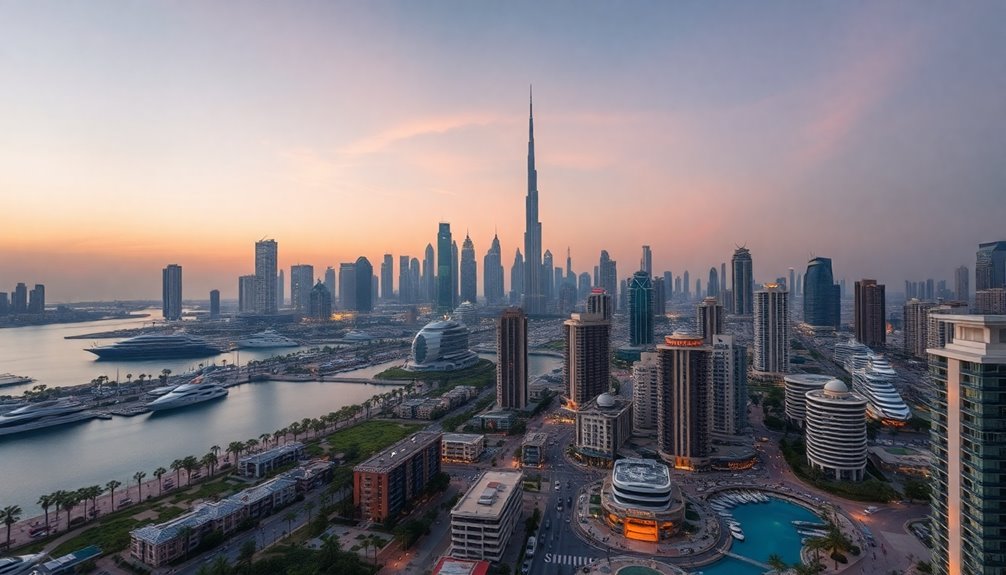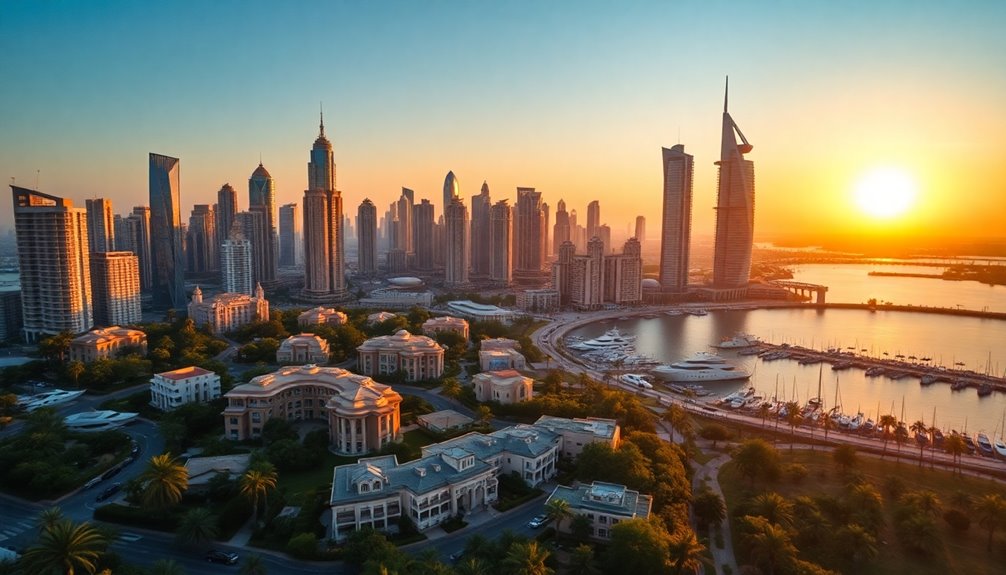Investing in Dubai's property market can be a smart move for you as a foreign buyer. You don't need a residence visa, just a valid passport to buy in designated freehold areas, where you'll enjoy full ownership rights. The market shows promising trends with price growth and high rental yields of up to 8%. Financing options are available, often requiring a deposit and proof of income. Plus, there are no property taxes. If you're keen to maximize your investment potential and navigate the buying process effectively, you'll find plenty of valuable insights ahead.
Key Takeaways
- Foreign buyers can purchase property in designated freehold areas without needing a residence visa, making the process accessible.
- Strong demand is driving annual price increases of 5% to 7% in prime locations, indicating a thriving market.
- Initial deposits are typically around 10%, with financing options requiring proof of income and good credit history.
- High rental yields of up to 8% and no property taxes enhance profitability for investors in Dubai real estate.
- Investment over $204,000 grants eligibility for a residence visa, incentivizing foreign investment opportunities.
Eligibility Criteria for Foreign Buyers

When it comes to investing in Dubai's property market, foreign buyers find themselves with a clear set of eligibility criteria.
First and foremost, you'll need a valid passport to confirm your identity during the purchase process. Fortunately, you won't require a residence visa, which simplifies things markedly.
While not mandatory, opening a local bank account is a smart move for managing your property-related payments. Additionally, foreign nationals can purchase property on a freehold basis, enhancing the appeal of investing in Dubai.
You may need to provide proof of income or employment, especially if you plan to apply for a mortgage. Non-residents can apply for mortgages, but keep in mind that options are limited and criteria differ from bank to bank.
Typically, banks will ask for bank statements and proof of your work status. Your country of residence can also affect your mortgage eligibility, so it's wise to check with potential lenders.
Lastly, be prepared to submit various documents, including your passport and any necessary IDs, to guarantee compliance with local regulations.
Understanding these eligibility criteria can help you navigate the investment process smoothly and make your property purchase in Dubai a reality.
Prime Freehold Areas for Investment

When it comes to investing in Dubai, you'll want to focus on prime freehold areas that promise strong returns. Locations like Downtown Dubai and Dubai Marina stand out for their high rental yields and demand. Additionally, emerging hotspots like Jumeirah Village Circle offer budget-friendly options with great potential for growth. Investing in these areas allows for complete ownership of land and buildings, providing long-term security for property owners.
Top Investment Locations
Investing in Dubai's prime freehold areas can be a lucrative opportunity for both seasoned investors and newcomers alike.
One of the top locations is Downtown Dubai, where you'll find ultra-luxury apartments near the Burj Khalifa and Dubai Mall. With rental yields ranging from 5% to 8%, this area enjoys strong demand from residents and tourists, albeit at premium prices. Additionally, the increased demand for freehold properties among expatriates makes this area particularly appealing for long-term investment.
Dubai Marina, known for its vibrant lifestyle and stunning skyline, offers a more affordable entry point, with studios starting from AED 650k. Here, you can achieve rental yields of 6% to 9%, appealing to expats and young professionals drawn to its luxury apartments.
Emirates Living provides diverse communities, including Emirates Hills and The Lakes, featuring villas and townhouses perfect for families. With rental yields between 6% to 8%, this family-friendly area boasts an upscale living experience.
Lastly, Jumeirah Village Circle (JVC) offers budget-friendly townhouses and apartments, with yields ranging from 7% to 10%. With 3-bedroom townhouses available from AED 1.25 million, JVC meets the needs of growing families while providing valuable community amenities.
Each of these locations offers unique advantages for your investment portfolio.
Emerging Property Hotspots
As you explore Dubai's real estate market, you'll discover a range of emerging property hotspots that promise excellent investment potential.
Downtown Dubai stands out with its iconic landmarks like the Burj Khalifa and Dubai Mall. Here, ultra-luxury apartments boast rental yields between 5% and 8%, making developments like Burj Vista and Forte attractive options. This area benefits from tax-free environment, allowing investors to maximize their returns.
Next, consider Dubai Marina, known for its stunning skyline and vibrant lifestyle. With entry-level studios starting at AED 650k and rental yields of 6% to 9%, projects like Marina Gate offer excellent value.
Emirates Living and its surrounding areas, including Emirates Hills and The Lakes, provide family-friendly environments with villas and townhouses showing rental yields of 6% to 8%. These communities are in high demand from families and expats seeking spacious living.
Lastly, Jumeirah Village Circle (JVC) and other affordable areas like Green Community present budget-friendly options. Here, rental yields can range from 7% to 10%, with 3-bedroom townhouses starting at AED 1.25 million.
These emerging hotspots highlight Dubai's diverse investment landscape, catering to various buyer needs.
Key Features of Areas
Dubai's prime freehold areas are a treasure trove for investors seeking high returns and vibrant living environments. Each area offers unique features and investment potential, making them ideal choices for both residential and rental properties.
| Area | Key Features | Rental Yields |
|---|---|---|
| Downtown Dubai | Iconic landmarks, ultra-luxury apartments | 5% to 8% |
| Dubai Marina | Vibrant lifestyle, stunning marina views | 6% to 9% |
| Emirates Living | Upscale villas, peaceful surroundings | 6% to 8% |
| Jumeirah Village Circle (JVC) | Budget-friendly townhouses, strong family demand | 7% to 10% |
In Downtown Dubai, you'll find luxurious living with access to top-tier amenities, while Dubai Marina boasts a lively atmosphere with affordable entry-level studios. Emirates Living offers a serene lifestyle, perfect for high-profile residents, and JVC provides budget-friendly options with strong rental yields. Each area not only caters to diverse preferences but also promises solid returns on your investment, ensuring you make the most of your property venture in Dubai. Additionally, purchasing property in these areas requires a residency visa or company establishment, streamlining regulations to facilitate foreign investment.
Advantages of Dubai Real Estate

When it comes to property investment, few markets offer the compelling advantages found in Dubai real estate. You can expect high rental yields, reaching up to 8% annually, which is considerably higher than many global cities.
One of the most attractive features is the absence of property taxes, capital gains taxes, or private income taxes, making your investment even more profitable. With low maintenance costs and the ability to generate immediate income from ready-commercial properties, your financial prospects look bright. Additionally, Dubai's property market is experiencing a record growth in transaction volumes, further enhancing the attractiveness of real estate investments.
Additionally, Dubai allows freehold ownership, giving you full rights over your property. If you invest over $204,000, you'll also become eligible for a residence visa, offering options for either 2-year or 5-year stays. The process of owning property is straightforward, involving a No Objection Certificate and registration with the Dubai Land Department.
Strategically positioned as a global business hub, Dubai boasts a growing economy and booming tourism, fueling demand for real estate.
With world-class amenities, safety, and a vibrant lifestyle, investing in Dubai real estate isn't just a financial decision; it's an opportunity for a high-quality life you won't want to miss.
Current Market Trends Overview

As you explore the current market trends in Dubai, you'll notice projected price increases driven by strong demand factors. Luxury properties are particularly thriving, attracting both local and international investors keen to capitalize on the city's growth. With over 43,000 property transactions occurring in the first half of 2024, understanding these dynamics will help you make informed decisions in this vibrant real estate landscape.
Projected Price Increases
The real estate market in Dubai is experiencing a remarkable upswing, with projected price increases in prime locations reflecting strong demand and investor interest. Properties in sought-after areas like the city center and waterfront zones are seeing annual increases of 5% to 7%. High-end locations, such as Palm Jumeirah and Dubai Marina, boast even higher annual growth, surpassing 10%.
Here are some key trends to evaluate:
- Villa prices in Arabian Ranches rose by up to 13% in Q3 2024, showcasing the luxury segment's resilience.
- Luxury sales transactions over AED 10 million soared by 47% in the first half of 2024, indicating robust demand.
- The market is projected to grow an additional 5% in 2024, supported by last year's $100 billion in investments.
- The ValuStrat Price Index reported a 19.9% growth in property values in 2023, laying a solid foundation for future price increases. Furthermore, the strong recovery in property prices demonstrates investor confidence in the market.
With a compound annual growth rate (CAGR) of over 8% anticipated from 2024 to 2029, now's an opportune time to capitalize on Dubai's thriving property market.
Strong Demand Factors
Strong demand factors are driving Dubai's real estate market to new heights, making it an appealing environment for investors. The city's robust economic growth, projected at 4.5%, is a significant contributor to this momentum. Additionally, property prices in Dubai increased by approx. 6% in Q1 2024, reflecting the rising demand.
Government investments in infrastructure and favorable policies are attracting foreign capital, further boosting demand for both residential and commercial properties.
The employment market is thriving, which enhances the need for housing and office spaces. Plus, continuous infrastructure development, including improved transportation networks, supports this growth.
Internationally, high-net-worth individuals are increasingly interested in Dubai, driving property prices up, especially in high-end areas. The city's status as a global investment hub guarantees a diverse and resilient investor base.
Recent policy changes, such as long-term residency visas, make Dubai more appealing for long-term investments, while regulatory balance guarantees a sustainable marketplace.
The recovery of the tourism sector and a growing population, including a steady influx of expatriates, also contribute to the demand for rental properties.
All these factors create a vibrant real estate landscape that you shouldn't overlook when considering your investment options in Dubai.
Luxury Market Growth
Dubai's luxury real estate market is booming, showcasing remarkable resilience and growth despite fluctuating inventory levels. In the first half of 2024, sales of 190 high-end homes reached an impressive $3.2 billion, nearly matching last year's figures.
Significantly, luxury transactions over AED 10 million surged by 47%, reflecting strong demand.
Here are some key highlights of the current luxury market trends:
- Prime Areas: Property values in sought-after locations like Palm Jumeirah and Jumeirah Bay rose 35.1% per square foot.
- Sales Surge: Homes priced over $25 million saw a 25% increase in sales from Q1 to Q2 of 2024, indicating a surge in the ultra-luxury segment.
- Top Locations: Palm Jumeirah accounted for 26% of luxury home sales, with Downtown Dubai and Dubai Marina also witnessing substantial price hikes.
- Future Growth: The luxury residential market is projected to grow over 8% CAGR through 2029, driven by increasing international investment.
With high-net-worth individuals increasingly opting for long-term ownership, the Dubai luxury market is poised for continued success.
Now's the time to explore the opportunities this vibrant market presents.
Legal Framework for Foreign Buyers

Maneuvering through the legal framework for foreign buyers in Dubai can feel intimidating, but understanding key regulations makes the process smoother.
As a foreign national, you can purchase property in designated freehold areas without needing a residence visa. These areas include popular locations like Dubai Marina, Downtown Dubai, and Palm Jumeirah, among others.
While you can enjoy full ownership rights in freehold zones—allowing you to sell, lease, or rent—other properties are limited to 99-year leases. If you're a foreign company with non-UAE or GCC shareholders, you face the same rules as individual buyers.
The Real Estate Regulatory Agency (RERA) oversees the property market under the Dubai Land Department (DLD), ensuring compliance with local laws. Law No. 7 of 2006 governs property ownership, clearly outlining your rights as a foreign investor.
To start, you'll need to provide a valid passport and additional documentation verifying your financial status, especially with new AML regulations in place. Additionally, the average rental yield in Dubai reached 7.2% in Q2 2024, making it one of the most profitable real estate markets globally.
Importantly, the UAE doesn't impose taxes on property purchases or rental income, making it an attractive market for investment.
Buying Process and Considerations

When it comes to maneuvering the buying process in Dubai, understanding your options and the necessary steps can greatly enhance your experience.
Start by identifying the type of property that fits your investment goals, whether it's an apartment, villa, or commercial space. Next, consider the location—areas like Dubai Marina and Palm Jumeirah are popular choices, especially since these areas are classified as freehold properties.
Here are four essential steps to follow:
- Choose a Licensed Agent: Work with a RERA-licensed real estate agent to guarantee a legitimate transaction.
- Conduct Property Inspections: Inspect properties physically or virtually to assess condition and suitability. Don't hesitate to schedule multiple viewings.
- Make Your Offer: Once you find the right property, submit an offer through your agent and negotiate terms as needed. Be prepared to pay a deposit, typically around 10%.
- Finalize the Purchase: Obtain a No Objection Certificate from the seller, clear any liabilities, and register the property with the Dubai Land Department to receive your title deed.
Financing Options for Foreign Investors

For foreign investors looking to finance property in Dubai, understanding the mortgage landscape is essential. First, you'll need to meet specific eligibility criteria set by banks, which often include proof of income, a good credit history, and minimum monthly income requirements—typically around AED 25,000.
Age limits usually apply, generally between 25 and 65 years old, and citizenship from certain countries may be favored. When it comes to down payments, expect to pay at least 20% for properties valued up to AED 5 million, and 30% for those above AED 5 million. Loan-to-value (LTV) ratios can vary but often cap at 50% of the property value.
Different banks may have unique approved developers and projects for mortgages, so it's wise to shop around. In addition, it's important to consider the impact of location on property value as it can significantly affect your investment potential.
Loan amounts can range considerably, with some banks offering up to AED 10 million or AED 15 million. You can typically secure a loan tenure of up to 25 years, but make sure to check age restrictions at the loan's end. Finally, interest rates generally range from 6.5% to 9.5% per annum, with additional costs like registration fees and agent commissions to take into account.
Tips for Successful Investments

Successful property investment in Dubai hinges on a clear understanding of the market and strategic planning. To maximize your chances of success, keep the following tips in mind:
- Research Market Trends: Stay updated on the dynamic real estate landscape. With a predicted 5% rise in 2024 and an impressive 8% CAGR from 2024 to 2029, knowing when to buy is essential. The resilience of the market amid global economic fluctuations further reinforces the importance of staying informed.
- Choose the Right Location: Focus on popular freehold areas like Jumeirah Village Circle and emerging hotspots like Dubai Silicon Oasis. These locations not only offer affordability but also long-term growth potential.
- Evaluate Property Types: Decide whether you want off-plan properties with high ROI potential or ready projects for immediate rental income. Diversifying your investments can also mitigate risks.
- Understand Legal Compliance: Familiarize yourself with the legal framework for foreign ownership. Consulting with a local attorney can help you navigate regulations and secure your investment.
Frequently Asked Questions
What Are the Typical Closing Costs for Foreign Property Buyers in Dubai?
When you're buying property in Dubai, expect to pay several closing costs.
You'll need to cover the DLD registration fee, usually 4% of the purchase price, plus additional fees for title deeds and service partners.
Don't forget about potential mortgage registration fees and real estate agent commissions, often around 2% of the purchase price.
Budget for around 7-10% of the property's value to account for these costs and other miscellaneous fees.
Can Foreigners Buy Property in Dubai Without Visiting the Country?
Buying property in Dubai without visiting is like sailing a ship without ever seeing the shore. You can do it!
With a trusted real estate agent, you can navigate the entire process remotely. You'll need to provide a valid passport and may need to grant power of attorney to someone local.
They can handle all the paperwork and negotiations on your behalf, making it feasible to invest in Dubai from anywhere in the world.
What Types of Properties Offer the Best Investment Returns in Dubai?
When considering investment returns in Dubai, ready properties typically shine with immediate rental income and luxury amenities.
You can expect an ROI of 5-8% for long-term leasing. Off-plan properties, while offering lower purchase prices, hold potential for significant capital appreciation.
Additionally, residential properties, especially studios and one-bedroom apartments, often yield the highest returns.
Always research the area and consider your investment strategy to maximize your profits effectively.
Are There Any Restrictions on Renting Out Purchased Properties?
No, there aren't any restrictions on renting out purchased properties in Dubai's freehold areas.
You can freely lease or rent your property as you see fit. This flexibility allows you to maximize your investment returns.
However, make sure you comply with local laws and register your property with the Dubai Land Department.
If you're considering leasehold properties, keep in mind that they come with specific terms and may have restrictions.
How Does Property Management Work for Foreign Owners in Dubai?
Did you know that property management fees in Dubai typically range from 2-5% of annual rent?
For foreign owners, property management companies handle everything from maintenance and tenant screening to legal compliance.
They provide tailored management plans, ensuring you maximize your rental income while minimizing stress.
With their expertise, you can navigate local laws and market trends effectively, making your investment experience smoother and more profitable, even from afar.
Conclusion
In the vibrant world of Dubai property investment, seizing the opportunity can be your ticket to a lucrative future. With the right knowledge and strategy, you can navigate the market like a pro. Remember, in a city where dreams are built on sand, your investment can become a solid foundation. So, why wait? Immerse yourself, explore the possibilities, and watch your investment flourish in this dynamic landscape that beckons foreign buyers like you. As you bask in the success of your Dubai property investment, consider diversifying your portfolio by venturing into Istanbul real estate investment. With its rich history, bustling markets, and strategic location, Istanbul offers a unique and promising investment opportunity. Just like in Dubai, with the right knowledge and strategy, you can make the most of the Istanbul real estate market and unlock the potential for a profitable future. So, don’t limit yourself to one market – seize the opportunity in both Dubai and Istanbul to truly maximize your investment potential.









